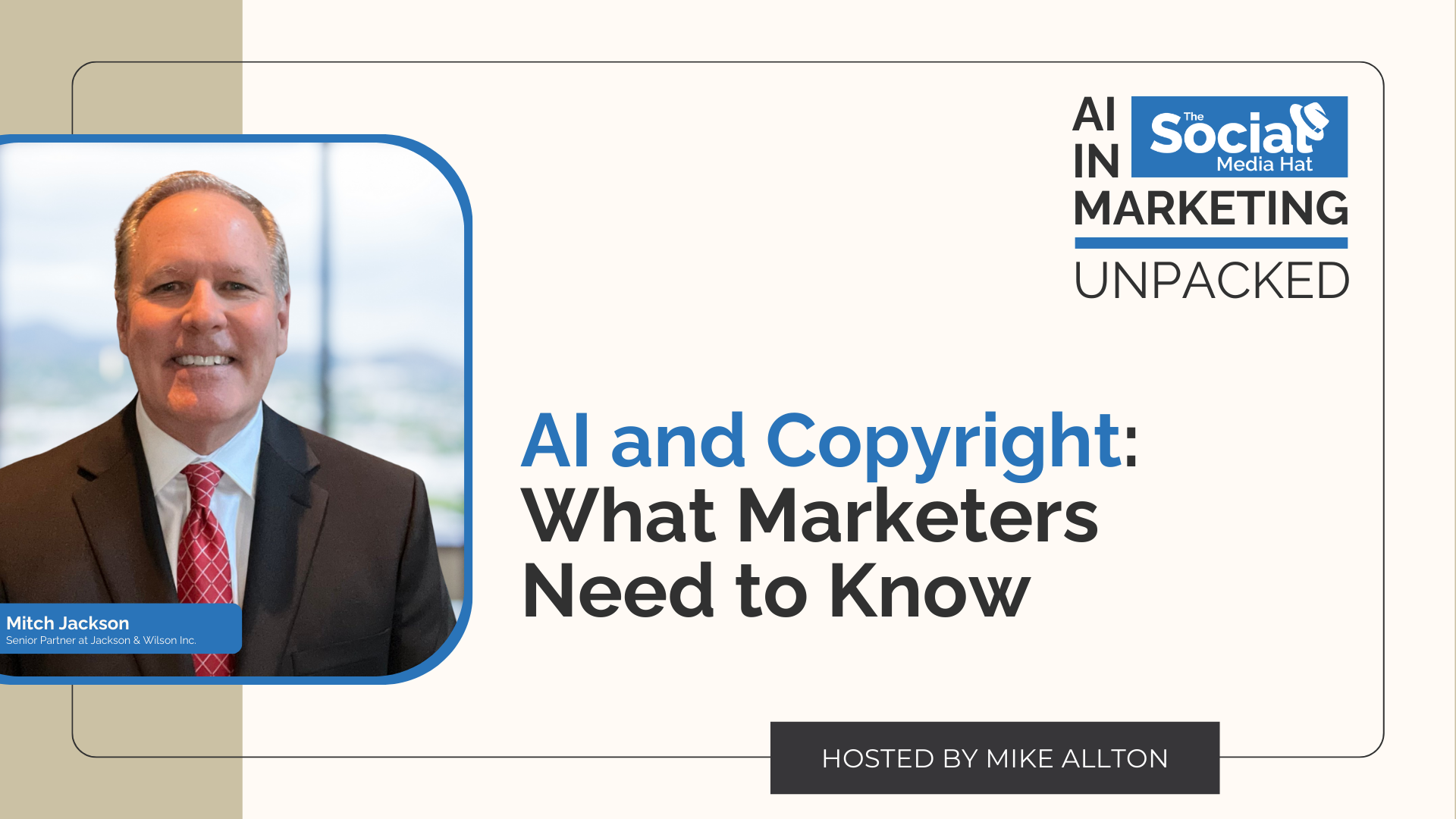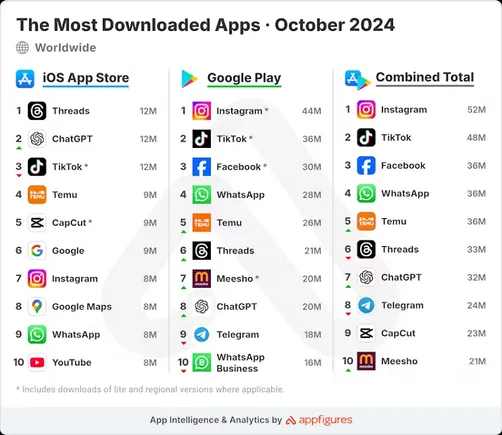Reading Time: 28 minutes
Are you using AI tools to create content for your marketing campaigns? Have you ever wondered about the legal implications of that content? Are you sure that your AI-generated creations are protected under current copyright law?
In the age of AI-driven creativity, leveraging artificial intelligence tools to produce engaging content is becoming commonplace for marketers and agencies. However, this innovative approach brings its own set of challenges and complexities, particularly around intellectual property and copyright law. How can marketers ensure they are compliant and protect their innovations?
LISTEN TO AI IN MARKETING: UNPACKED:
WATCH AI IN MARKETING: UNPACKED:
Today, we’re joined by Mitch Jackson, Senior Partner at Jackson & Wilson, Inc., and an expert in legal issues related to AI. With more than three decades of legal experience, he’s the seasoned professional you want in your corner. But Mitch’s expertise doesn’t stop at traditional civil litigation; he’s also adept at navigating the complex intersections of law, business, and technology. From everyday civil disputes to cutting-edge issues in AI, Web3, and the metaverse, Mitch transforms conflict into collaboration. Mitch will shed light on the intricacies of AI and copyright, offering essential insights and strategies that marketers and agencies need to know to stay on the right side of the law.
AI in Marketing: Unpacked host Mike Allton asked Mitch Jackson about:
✨ Understanding AI and Copyright : Learn about the key differences between traditional content creation and AI-generated content from a legal perspective.
✨ Protecting AI Creations: Discover steps marketers can take to protect their AI-generated content and ensure compliance with intellectual property laws.
✨ Staying Ahead of Legal Changes: Gain insights into upcoming trends in IP law and practical advice for staying proactive and informed.
Learn more about Mitch Jackson
Resources & Brands mentioned in this episode
Full Transcript
(lightly edited)
AI and Copyright What Marketers Need to Know with Mitch Jackson
[00:00:00] Mitch Jackson: A lot of people think that when they’re creating content, especially with AI, that for some reason it’s copyright protected. And I think that’s something that a lot of people have wrong. For example, if I was creating something on my own, it was an idea and I sat down and drew a picture or wrote a page in a book or created a video.
Using my own human authorship, then automatically there’s a copyright attached to it. It’s something that’s unique. It came from my thought process and I created it and I’m using it in my marketing efforts. Right now, generally speaking, when you are creating content using AI, whether you’re creating an image with Chat GPT or mid journey or creating a video using one of the new video AI generation services, or maybe an audio. The general rule is that you don’t have a copyright for what the response gives you.
[00:00:56] Mike Allton: Welcome to AI in Marketing: Unpacked, where we simplify AI for impactful marketing. I’m your host, Mike Allton here to guide you through the world of artificial intelligence and its transformative impact on marketing strategies. Each episode, we’ll break down AI concepts into manageable insights and explore practical applications that can supercharge your marketing efforts.
Whether you’re an experienced marketer just starting to explore the potential of AI, this podcast will equip you with the knowledge and tools you need to succeed. So tune in and let’s unlock the power of AI together.
Greetings program. Welcome back to AI in Marketing: Unpacked, where I selfishly use this time to pick the brains of experts at keeping up with and integrating, or layering, artificial intelligence into social media, content, advertising, search, and other areas of digital marketing. And you get to learn to subscribe to be shown how to prepare yourself and your brand for this AI revolution and come out ahead.
Are you using AI tools to create content for your marketing campaigns? Have you ever wondered about the legal implications of that content? Are you sure that your AI generated creations are protected under current copyright law? In the age of AI driven creativity, leveraging artificial intelligence tools to produce engaging content is becoming more Commonplace for marketers and agencies.
However, this innovative approach brings its own set of challenges and complexities, particularly around intellectual property and copyright law. How can marketers ensure they’re compliant and protect their innovations? Today, we’re joined by Mitch Jackson, senior partner at Jackson and Wilson Inc, and an expert in legal issues related to AI with more than three decades of legal experience.
He’s the seasoned professional you want in your corner, but the Mitch’s expertise doesn’t stop at traditional civil litigation. He’s also adept at navigating the complex intersections of law, business, and technology from everyday civil disputes to cutting edge issues in AI, Web3 and the metaverse.
Mitch transforms conflict into collaboration. Mitch will shed light on the intricacies of AI and copyright offering essential insights and strategies that marketers and agencies need to know to stay on the right side of the law. Hey, Mitch, welcome to the show.
[00:03:09] Mitch Jackson: Mike, it’s always good to see you. Thank you so much.
And thank you for putting the bar nice and high where I have nowhere to go but, but downwards, this is, this is fantastic to see you again. And it’s always a pleasure to be on anything associated with Agorapulse.
[00:03:23] Mike Allton: Thank you, sir. I appreciate that. If you could start by just sharing a bit about your background, how you’ve come to focus on legal issues related to AI and some of these similar new technologies.[00:03:34] Mitch Jackson: Well, it was it came from just a need to be able to compete in Orange County, California. When I started my practice, which was before the internet, as we know it, certainly before social media. What I quickly learned, Mike, was leveraging technology, the Internet, building out a website, building out a social media presence, allowed me to, to compete with the big firms, to add value, to help more people, to, to do a better job for consumers.
And fast forward to today’s world with Web3 and with AI technology, I see everything that I experienced back in the late 80s and early 90s, 100x. In other words, I’m all in on AI’m all in on Web 3 and actually the metaverse too, because I see this as an opportunity to change everything we’re doing.
I think it’s going to have a greater impact on what we’re doing as business owners, as lawyers for our clients, for entrepreneurs than probably the printing press, electricity and the Internet combined. This is something new. It’s exciting. And that’s why I dived into it because it allows us to change to compete and do a better job for our clients.
Yes.
[00:04:36] Mike Allton: And I’m so glad you did because we’ve known each other for years as a result of your interest in digital technology, digital marketing. Heck, we, we met at a marketing conference many, many years ago. So I appreciate that. So with that expertise and that experience, could you explain just some of the key differences to the audience between, you know, what we would call traditional and traditional marketing?
Content creation and AI generated content from that legal perspective.
[00:05:03] Mitch Jackson: So we have about five or six hours to set aside, right? So let me start off, you know, so let me start off today’s conversation with, look, this is a quickly and evolving area of law, of, of business, of liability, of creating new user experiences.
So anything we talk about today. You know, there is a disclaimer. I’m not sharing legal advice. We’re simply having a conversation about this new and quickly growing topic. So to start things off, my answer to your question probably isn’t what you would expect right off the bat. Yes, intellectual property is very important when it comes to copyright, trademarks, trade names, things like this, when we’re generating artificial intelligence content.
I want the viewer to pay attention to licensing rights. I want the viewer to pay attention to terms of service agreements.
I want the viewers to really pay attention to contractual relationships between a company, a client, and maybe a third party service Provider who’s helping create AI generated content for marketing and branding. So there’s a lot more than just I P. That’s involved in this type of content or marketing or branding production.
And I think we need to start to show off by by acknowledging that because all of these things play together with keeping marketing companies, branding companies, agencies safe and sound when it comes to using AI or generated content. In their commercial marketing efforts, whether it’s for their own company or for clients.
[00:06:33] Mike Allton: Got it. Got it. So what are some misperceptions then when it comes to copyright and AI generated content that marketers specifically really need to know about?[00:06:41] Mitch Jackson: Absolutely. So, you know, I, I probably should have started things off with a lot of people think that when they’re creating content, especially with AI, we’re talking about.
AI gen or AI generated content that for some reason is copyright protected. And I think that’s something that a lot of people have wrong. For example, if I was creating something on my own, it was an idea and I sat down and drew a picture or wrote a page in a book or created a video using my own human authorship, then automatically there’s a copyright attached to it.
It’s something that’s unique. It came from my. Thought process and I created it and I’m using it in my marketing efforts. Right now, generally speaking, when you’re creating content using AI, whether you’re creating an image with chat, GPT or mid journey, or creating a video using one of the new video AI generation services, or maybe an audio.
The general rule is that you don’t have a copyright for what the response gives you. So you’re prompting. It’s creating content, whether it’s written, audio or video. Maybe it’s an image, but you don’t have a copyright under the U. S. Copyright rules, regulations and laws for that generated image. And I think that’s the that’s the initial misconception that creators have.
They feel it just because they think they create something. They have a copyright for it. And in fact, that’s not the case with AI generated content.
[00:08:11] Mike Allton: The guideline that comes to mind that I may have even read from you someplace, I’m not sure where I heard this was that because it’s not human generated and therefore it cannot be defended in court, copyright can’t apply.
And I think there was a precedent perhaps with, with art created by a gorilla or a chimpanzee because it can’t defend itself in court. Therefore there cannot be any kind of copyright.
[00:08:40] Mitch Jackson: Well, All right. So, so let me jump right in. I remember that that chimpanzee or monkey taking a picture and I don’t want to talk about that case because a lot’s happened since then.
But what it comes down to is a concept called human authorship. And if you as a human being weren’t primarily responsible for creating the content. Then it’s not something that can be copyrighted and the beautiful thing about today’s show, Mike, is that the copyright office has actually come down with a letter with a PDF document that lays all of this out and I’ve linked to it through my website.
So your viewers, your listeners. If you don’t mind, I can just share the link and they can look for themselves as to what the copyright offices mindset, what the rules and regulations, what the case law says about copyright law. It really doesn’t have too much about being able to defend yourself in court, take a couple of steps back.
It has to do with, was there human authorship behind the creation of the content? And that article is linked at Mitch. MitchJackson. com forward slash copyright office, MitchJackson. com forward slash copyright office. I’m sure you’ll put that in the show notes and at that link, you’ll be able to link directly to the latest copyright advisory letter that explains exactly what needs to happen or what can’t happen if you want to copyright something like an image, a book, a video, a song, whatever it may be.
And also, there are links to. 40 plus cases in regulations at the end of that article that will allow you to click and actually read cases where a creator has to submit an item to the copyright office for copyright protection, but it was rejected because of the following three reasons, and each of those items is available at that link.
One case I’d like to reference. Well, you know what? Everything’s there at that link and the cases are progressing. In other words, The case that came out a couple of weeks ago might be different than the case that comes out next week. And a good place to start is just think about if you’re not, if there isn’t human authorship primarily behind the creation of content, then 99 times out of 100, you’re not going to be able to secure copyright protection.
Of that content, there are some exceptions. If that content that you created using using artificial intelligence was part of a bigger picture, part of a comic book, part of a encyclopedia Britannica, for example, and it’s just Images within copyrighted text or images within other copyrighted material, then there may be an argument that the larger project might be able to acquire copyright protection, but the images, the videos that are embedded within the music, the audios, that portion of the content may not be copyrightable.
So it’s confusing. It’s there are a lot of gray areas right now in this area of the law. But I think the general rule is if you didn’t create this as a human being, or if you’re an agency and you’re, you’re hiring out to third parties to create content for you, you need to pay attention to the content that’s coming in, the content you’re using for commercial purposes.
It may not be copyrighted in the first place. And if you’ve got a client that’s spending 7 million for a 32nd Super Bowl ad next year, that involves content created by a third party on behalf of your agency using artificial intelligence, there may be a problem down the line with using this type of Auto auto intelligence generated content.
So you want to be really careful and you want to have rules and regulations within your team as to how the content’s created and how it can be used.
[00:12:41] Mike Allton: That’s the cautionary tale that I knew you would bring to this episode. That’s why I brought you on. And I want everyone listening to just go back and listen to the last.
60 to 120 seconds, because that’s such an important point that I need to even underscore for you, you cannot protect content that you’ve created using AI. And if that’s content that you’re delivering to a client, they’re not going to have any copyright control over it. And if somebody duplicates that ad or that ebook or something, and they want to take them to court, they’re not going to be able to, and they’re going to be looking at you as the agency.
Is the one being at fault for that kind of a situation and putting them in that situation. You said it better than I, you said it better than I did, by the way, Mike. So thank you for that. Well, I had, I had a specific learning that I knew we were going to get out of this and that was the piece that I wanted to underscore.
So I appreciate you bringing that up and I appreciate you sharing that resource. We will absolutely include that in the show notes and I love that includes case examples because You started with a disclaimer perfectly said, and I should also add a disclaimer that, you know, we’re recording this on July 10th of 2024.
And like every other aspect of AI, these things are changing literally on a, on a daily weekly basis. So this is a topic we’ll probably have to come back to in, you know, 6, 12, 18 months, but you, you mentioned an example and I’d love if you could share that the case that you were going to about to reference, I think that’d be a fantastic for the audience to understand a little more.
Practically how this is being applied or not being applied. What was that, that, that case that you were thinking of?
[00:14:14] Mitch Jackson: The case I believe I was thinking about, I refer to as the paradise case and it’s actually, actually linked at my website in that same URL. And it just has to do with a piece of art that was generated and created by artificial intelligence that was submitted to the copyright office for copyright protection.
And the reason I found that case interesting at the time, I think it’s about a year ago. Is the Copyright Office shared a detailed response letter five, six, seven pages long explaining copyright law, explaining why they would not be granting copyright protection to this particular submission. And I think anyone that reads that, whether you’re submitting an image.
An audio a video any type of content that you’re submitting for copyright protection I think it explains from a to z what you need to pay attention to moving forward you know, you brought up agency liability Mike and and before we we move forward with the conversation I want people to think about if you’re a creator if you’re a business owner if you’re an agency and you’re Reaching out to third parties to help create your content so that you can help your clients, right?
There’s nothing wrong with that It’s just a matter of you want to do it the right way Pay attention to a couple of other things in addition to copyright law and I think this is where I see a lot of clients dropping the ball Mike and that is you want to make sure that if your third party Creator is using mid journey or DALL-E two or one of the other AI generation generation tools.
Understand what the license agreement is between whoever’s using that tool and the service that’s providing that tool. And what I mean by that, for example, is if you look at Chat GPT, open AI’s four point X, whatever it is now, look at the licensing agreement and see exactly what it says, because there are all types of issues.
In other words, do you even have the legal right to use what you’re generating as content in a commercial setting, number one. Number two, are you inadvertently disclosing private information to third parties which then may possibly waive any intellectual property protection when you’re including information in the prompts?
And a good example of that is, let’s say that I happen to know Coca Cola’s secret recipe for their soft drink. If I type into a prompt, this is Coca Cola’s secret recipe that makes it so tasty. And it’s exactly what I want after a long run, but I know I can’t drink it for health purposes. And I put the secret formula in there and I say, improve this formula.
I want you to make it healthier. I want it to have less sugar. There’s an argument that by disclosing that formula within the prompt, depending on what service you’re using. You may have waived your intellectual property rights to the proprietary information within that formula. Each licensing agreement is different for each AI platform.
So take some time, study the TOS agreement, study the licensing agreement, and see exactly What you have the right to do the last thing before I hand the mic back over to you, Mike. This is super important. Our privacy issues. Check the privacy issue of the license agreement or the TOS agreement that you’re using because in almost everyone that I’ve seen.
You’re actually giving these companies permission, and I’m not saying this is good or bad. I’m just sharing what I’m seeing. You’re giving these companies permission to use the information that’s being put into these data sets that you’re typing into the prompts to help them improve their service to you, not only internally, but with third parties around the world.
I don’t know what that means. Okay. In other words, if I’m typing in private client information and it’s a paid service and I’m behind an API that privacy agreement, that TOS probably still applies to me even more so. And the next question is what am I giving them the ability to use and see and do?
And so I want the consumer, whether it’s a small business owner, whether it’s a large agency, whether it’s a third party supplier. Like we’ve talked about to really take some time and look at the agreements that you’re agreeing to when you sign up for these platforms to make sure that you understand fully and completely what it is.
You’re agreeing to give them access to when, when you’re using their products and services.
[00:18:39] Mike Allton: Those are, those are hugely powerful points to kind of frame it from marketing perspective. Suppose you as an agency are pushing proprietary persona information into An AI to try to get the AI’s help to help you craft marketing strategy and content, which a lot of us are doing.
You’re informing the AI, what that, that persona data is, if you’re doing reporting and you’re putting, you know, past campaign data from a client into chat GPT so that chat GPT can help you analyze, you know, where you went wrong on, on, on several failed campaigns and what you should have done differently.
Those are all really valuable use cases for AI, but because you’re doing it in a Basically public large language model. And you haven’t paid attention to the terms of service. As, as Mitch just said, you didn’t realize that you are also training the model on that data in those circumstances, which means this probably wouldn’t happen, but this is.
Technically possible. If I wanted to do a blog post on the top 10 worst marketing campaigns, and I go into ChatGPT and ask ChatGPT, what are the 10 worst campaigns that you’ve ever seen? It might draw from the data that you as the agency owner had put in for your client six months ago. And because that campaign was so bad, now it ends up in a blog post that I’m creating because ChatGPT doesn’t know that that’s not information that you want.
Distributed to the World Wide Web. How embarrassed would you be or liable might you know,
[00:20:10] Mitch Jackson: and there are options on these services, you know, whether or not you want to share data. And, you know, the questions we have to ask ourselves is just be prudent and do your due diligence. In other words, Is what you’re agreeing to actually happening?
Do you really want your clients information, financial data directly or indirectly available? I mean, obviously, it’s being used to come up with the responses that we’re seeing in some way. And so we just really want our clients to pay attention to these issues. Where are these issues so that they can make smart decisions?
I’ll tell you right now. We love using AI to summarize medical records and things like this. But before we upload a PDF, which might be 3, 4, 500 pages. And by the way, what used to take us hours is now taking us 30 seconds. You know, we’re making sure that private information names anything that’s this proprietary.
It’s it’s not that. Put into the system, even though the system’s telling us the systems we use that it’s private and confidential because we’re lawyers and we sign up and pay for some additional services we’re still being very cautious about what we share. We’re using it for other reasons to ask open ended questions and for ideas right into troubleshoot.
Like you and I talked about before we went live, but I did want to bring this up at the top of the show that in addition to IP issues, there’s the privacy, there’s the licensing, there’s the term of service agreements that a lot of people aren’t paying attention to. And I really would like them is at least one takeaway of the show to do that once they’re done listening to what you and I are chatting about today.
[00:21:40] Mike Allton: Fantastic folks. We’re talking to Mitch Jackson about what you as a marketer need to understand when it comes to copyright over your AI generated work. And I’ve got a bunch more questions for Mitch, but before I get to those, let me share with you the tool that I’m using every single day to help me with every aspect of my marketing.
This episode of AI in Marketing: Unpacked is brought to you by Magai, your gateway to making generative AI, incredibly simple. And accessible wondering how to seamlessly integrate AI into your marketing strategy without getting bogged down by complexities. That’s exactly where Magai shines. It provides user friendly AI solutions that empower marketers just like you to innovate and elevate your campaigns without needing a degree in science.
Imagine having the power to generate creative content, insightful marketing data analysis, or even personalized customer communications, all at the touch of a button, Magai isn’t just about providing tools, it’s about transforming your approach to marketing with AI that’s tailor made to be straightforward and effective.
So whether you’re looking to boost your content creation process or want deeper insights into your marketing performance, Magai makes it all possible with a few clicks, no fuss, no hassle, just results. Ready to simplify your AI journey? Visit Magai today to learn how their solutions can revolutionize the way you engage with your audience.
with your audience. Don’t just market market smarter with Magai. Tap the link in the show notes. So Mitch, are there any steps at all that marketers can take that would actually protect AI generated content from potential copyright issues?
[00:23:15] Mitch Jackson: It’s a challenge. And I think the stress should be, or the focus should be on The contract engagements that you have with your clients.
In other words, I think full transparency that were if you’d like us to use artificial intelligence to help generate new content ideas to help come up with new strategies to help create new images, videos or audios, whatever it may be that you have a disclaimer. That that takes place between you and your client or an indemnity agreement or a hold harmless agreement where if there is litigation down the road, the client was aware that and gave you permission to use this technology to help create unique, entertaining, memorable content, but at the same time, understanding that That maybe there’s a problem down the line.
So I think the focus right now should be on companies moving over towards being fully transparent with what they’re doing, especially when they’re doing projects for third party clients. And if they are interested in. Using A. I. Generated content in marketing campaigns and things like this, probably educate everybody involved that that final item isn’t going to be protected by intellectual property.
And as long as you have that understanding from the very beginning, then you know what you’re getting into. And so I think that’s probably the starting point with the conversation. Obviously, any projects, any specific ideas should be run by the people involved. Your legal counsel or a qualified attorney that’s representing your company and your particular state, jurisdiction, country, or wherever you’re located around the world, because the laws are different, both nationally and globally, but, you know, running it by legal counsel, and then just having a new mindset when it comes to how you’re creating content.
I know marketing agencies, Mike, that Have actually put their foot on the brake when it comes to using AI to generate contact. They’ve, they’ve told their employees, don’t do it. We’re not saying it’s bad, but for the reasons I’ve already shared with you, they’re just not doing it right now because they understand with national or global ad campaigns, there are issues out there that haven’t been resolved.
And even if you’ve done nothing wrong, you don’t want to spend years in court. Hundreds, if not millions of dollars in attorney’s fees, proving to the world that you, you didn’t do anything wrong. So you just want to be cautious. Do you do diligence?
[00:25:37] Mike Allton: Yeah, that makes a lot of sense. Having that level of transparency seems to be the best way forward.
And it sounds like there’d be a trade off, right? If I’m an agency and I want to use a tool like Sora to create an amazing video for my client, in theory, that would probably cost less to the client than it would if they were to go out and try to film that level of video. Like we’ve seen these sort of videos where the camera angle is just literally soaring through the air, you know, over trains and through mountains and that kind of stuff to, to create that in real life would cost tens of thousands of dollars and, and weeks, if not months of shooting and editing.
You can do it in the afternoon with Sora once you have access to that. So there should be a cost break, I would imagine. And so to your point, simply be transparent with your client. If you want it tomorrow, we can do it with AI. It’s gonna be cheap and fast, but you’ll have no copyright over it. If you’ve got the budget and you’re willing to wait a few weeks, then we could do it the regular way.
So I appreciate that, that difference. You got a point
[00:26:37] Mitch Jackson: and one more element, and that is if we do what you just said, Mike. Understanding full transparency, will it unnecessarily expose you, the client, to litigation a year from now when someone steps forward and says that the AI used their copyrighted material in their LLM?
And that’s the challenge. Did you have a chance to meet Pete Salcich? At any of the events, he’s an IP lawyer, but I know who he is. Okay. And so Pete actually in his last couple of podcasts, he spoke at one of the social media events in San Diego. That’s why I was asking in one of his last couple of podcast episodes, he had two podcasts.
One had to do with the music industry and the new AI gen audio music platforms that are coming out, and he and his partner discussed the pros and the cons of the legal consequences of what people and consumers need to pay attention to. In the other podcast, they discussed the Scarlett Johansson voice on OpenAI’s voice and the legal issues associated with all of the above.
What you describe with using Sora. Yes, we could do this afternoon and provide to a client tomorrow. But if you listen to those podcast episodes, you’ll see that down the road, there could be consequences. And that’s why I started the show off today with, you know, just sharing with your creators to protect yourself from any longterm legal issues that may come up down the line because a client told you, Hey Mike, I want you to absolutely use Sora.
Or similar program to create this video to save us money to save us time and you do so and then find out 6 or 12 months later from a legal liability standpoint. That wasn’t a smart move. You want to make sure that the client has signed an indemnity or hold harmless agreement or that you’re covered by liability insurance in case something goes wrong.
I’m not saying this, this type of stuff is going to happen or it’s going to be the norm. The point of my comments is, are simply to point out that these are, these are realities that are being adjudicated and figured out right now in the court system. And we don’t know as we sit here today, what side of the fence the ball is going to fall on.
And so everyone just needs to pay attention to these issues. They’re very, very important.
[00:28:56] Mike Allton: That is a huge point. If you’re listening and you’re not quite sure what Mitch is talking about, he’s referring to the fact that all the large language models, whether the generating text, images, or video, they’ve been trained to understand predictively what should come next, right?
After they’ve been prompted, right? What word, what image pixels, what video scenes and so on, and they’ve been trained on material. And the questions that are coming up today in this industry is what material have these models actually been trained on? And if they were trained on copyright protective material, That’s a real problem.
We’re seeing that with perplexity, for instance. They’ve been in the news a lot recently. Again, this is mid July that we’re filming this and perplexity has been called out by Forbes specifically. They’ve been sued by Forbes and they’re being called up by other entities that said, like, we found our copyright material in responses generated by your large language model perplexity Specific case proving that that model used non public facing you know, free content out there.
And then a lot of the other ones have been accused or asked like Adobe with their Firefly product. There’s, been questions about that. So source, a good example where you’d have to know for a fact that the video material that was used to train Sora. Was in fact copyright free or royalty free and was available to be used for that.
And I don’t know that we would know that.
[00:30:26] Mitch Jackson: Yeah, I mean, these are the allegations, right? These are the allegations against perplexity. The New York Times case is a is a big legal case that’s pending right now that people can Google that’s also addressing some of the same issues and it’s in litigation right now.
You have famous authors, celebrities who have filed multiple lawsuits in publishing companies, multiple lawsuits against AI services for the same issues that you just described. I don’t know how all of this is going to turn out. It’s interesting, Mike, because you were describing large language models or even small language models, right?
And to some people, you know, the analogy would be walking into a library, a public library. Looking at books, looking at ideas, looking at magazines, reading the newspaper, and then writing an article or a blog post based upon what was available to the public. You’re, you’re able to do that. That’s, your article is not can be copyrighted because it’s unique.
You’re not copying somebody else’s content. You’re using that content for ideas to write your own article. But if in fact, the large language model is, Basically copying this content and then spitting it back out in its response. That’s, that’s the challenge right now that the courts and the lawyers are litigating, and I’m not really sure how that’s going to turn out.
It’ll be interesting to say, you know, one of the platforms one of the CEOs, somebody associated with it said, they just scrape YouTube videos and use that content in their AI generation video creation process. So Mike, I don’t know if you’ve given anyone permission to use your YouTube videos. I don’t know what the YouTube TOS terms of service agreement says about you and their ability to share your videos with these third party AI services.
So these are just interesting issues and elements that a lot of creators, a lot of business owners haven’t thought about that. Believe me the lawyers are thinking about, and I’m mediating cases. I’m mediating AI and web three cases right now, Mike, where Both parties were mistaken as to what the rights were, and they don’t want it to become public.
They just want to resolve these underlying issues and learn from their mistakes so they can get back to what they do and enjoy doing most, and that’s creating their products and services. So we’re doing private mediations, resolving these issues that is a learning experience for everybody involved, including yours truly.
So this is, this is the Wild West. But it’s an exciting wild west. And as you and I were talking about before we went live, this is, this is one of the most exciting things I’ve ever seen or been a part of. And we’re just getting started.
[00:33:08] Mike Allton: It is truly exciting, even though I know with this particular episode, folks, you might be feeling
a little frightened, maybe even a little bit disheartened. And that’s not really the goal. The goal is to just make sure that you need to be informed. You need to understand that, you know, there are valid concerns out there. There are potential risks. And that leads to my next question. Are there any other risks or consequences to not properly addressing IP issues and AI generated content that we haven’t already covered yet today?
[00:33:35] Mitch Jackson: We’ve covered the big picture, you know, risker issues, and maybe we should pivot to the benefits. Which is what I always like. I’m a half glass full kind of guy, right? And I think this is a really unique opportunity to leverage the power of AI to get past problems and issues and impasses and marketing challenges.
Oftentimes, Mike, you don’t need to put in private data in your prompt to come up with a solution. You can come up with creative prompts that will help you move forward so that you’re getting better results for your clients. I think we covered most of the big issues. We haven’t talked about hallucinations and deep fakes.
I think, you know, we see a lot of creators because a lot of people are doing this on Tik even on YouTube up until recently. where they’re using AI to put celebrity faces or celebrity movie shots promoting their private products and services. And that’s never been okay. And just because it’s easy to do now with AI, I think that’s a big area that people need to steer clear of.
And that is using AI to create deep fakes, giving the consumer the impression that you have a celebrity backing your product or service. The other thing I’d pay attention to is depending on the industry that you’re in. Look at your state and your national and even the global regulations dictating, you know, what you’re doing and how you’re doing it with AI, especially when you lean towards privacy rights.
You know, here in the state of California, we have a California privacy rights in Great Britain and Europe. There are privacy rights. And so you want to really make sure that if you’re playing in a particular sandbox with your private With your products and services, and you’re using AI to make that experience better for your clients, that you’re also up to speed on the rules and regulations involving privacy, involving anything to do with with digital currency, for example when playing in these particular sandboxes and each sandbox is different.
[00:35:38] Mike Allton: Staying abreast of local, national, and perhaps even international law. Fantastic advice. I’m going to tell everybody listening, first of all, make sure you subscribe to this show because we’re talking about marketing and AI and we’re bringing in experts and that sort of thing. But I don’t typically talk about, news,
I don’t typically talk about what’s trending today, unless it’s like we just happened to mention perplexity earlier of that sort of thing. But I don’t have a whole show about what’s changing this week in AI for that. I recommend you go over to the Marketing AI Institute show, the artificial intelligence show with Paul Roetzer and Mike Kaput.
They’re doing a Listen, hour, hour and a half long shows every single week. So that’s like three days of podcast listening for most of you, but that’s the, they’re going to keep you up to date. They’re going to tell you what’s the latest, not just in large language model and AI developments, but you know, who’s coming out with new legislation.
What’s, what’s happening in the courts and the law and the opinions of others that can impact how we use AI today and tomorrow. So on that note, I love Mitch. If you could share any upcoming changes or trends that you’re seeing when it comes to IP law that might affect AI content creation in the very near future.
[00:36:47] Mitch Jackson: Well, when you say new future and AI, are we talking a week out or are we talking six months out or six years? It’s definitely not years. It seems like everything’s happening very, very quickly. So here, here, here are my thoughts, everybody. So actually next Tuesday, which may be, you know, earlier or later than when this drops.
I have a book coming out that I, that I’m putting on a platform that allows me to dynamically update it. It’s for lawyers and the book’s titled AI in Law Revolutionizing Your Legal Practice with Innovative Strategies and Tools. The reason I, I’m bringing this up for everyone here is all of the major issues that lawyers looking at obviously are a chapter in the book.
At the very end of the book, I’m gonna have a resource section where I’ll be updating it with the latest resources and tools. Focus towards law, but Mike also, I think any business owner just, just line out the word lawyer and put in business owner. I think this stuff applies to everybody and what we’ll be doing is we’re going to be keeping it updated.
For example, I’m going to be subscribing to the podcast you just mentioned. I’m not subscribed to that podcast. I’m going to. And when I hear something that’s interesting or something that I think my clients need to know, We’re just going to update the resource section of the book. So I think one of the things that I talked about is prompting.
In other words, everyone’s talking about prompting and the power of a prompt and how to do the correct prompt. I actually based on the people I’m talking to and clients I’m representing and other lawyers in this space. And one of the unique things about being a lawyer is In this space is we get to see things 6 to 12 months out before the public, everything that we talked about, Mike is being reviewed right now by lawyers and law firms.
And I actually feel that probably within 12 to 18 months. AI is going to advance to the point where the power of prompting isn’t going to be as important as it is right now. In other words, understanding and needing to prompt something, AI is going to figure out what you’re looking for, what it is you need done, based upon either what you’re uploading, based upon prior content that you’ve already shared.
And so what I see happening is prompting actually changing. And with that may come a change with intellectual property, copyright protection. when it comes to prompting. In other words, if it gets to the point where you can argue that the quality of your prompt is the same at the same level than human authorship, then why wouldn’t that prompt actually itself be considered human authorship under the copyright rules and regulations?
And I shared a post a couple of weeks ago in my LinkedIn newsletter arguing, and I was just having some fun. That may be at a point in the future, prompting may actually satisfy that human authorship element that the copyright office is looking for. And if you fast forward to one or two years from now, that may all come back full circle where the whole IP issue with copyright, when it comes to prompting, when it comes to IP content creation, it may substantially change.
I think it’s going to take congressional action. I think it’s going to take legislation. Legislative action, and it’s also going to take different court decisions moving forward. So we are in an exciting time. None of us know the answers to any of the above. But what we do know is human authorship. Google it, look it up, read the links that I shared with your listeners and viewers, Mike, because I think it does explain as we sit here today, The things we need to pay attention to when creating content.
And if everyone just follows the copyright offices suggestions and recommendations, I think everybody will be safe and sound and they’ll be able to keep their clients happy with the content that they create on their behalf.
[00:40:35] Mike Allton: It’s a fascinating point about prompting. When I started using AI several months ago, one of the first things I did was I figured out how to use DALL-E three via, via Magai.
So I’ve been creating images for my blog posts and my social media. And I’ve just developed this this theme where it’s always a bear wearing a fedora hat, like I often do, but he’s in this kind of a space star Wars, he’s setting. And I recognize that I cannot even remotely begin to apply any kind of copyright protection to those images based on everything we just said.
Plus the fact that you just mentioned the prompting, my prompt is one sentence long. It is nothing complicated. It’s nothing particularly thoughtful. It’s what I like has to do with my brand and that’s it. But if we’re talking about the prep that I put into these, these Podcast episodes where I’ve done an extensive amount of pre work to build a custom GPT or custom persona, where I’m spending a lot of time creating this complicated prompt that helps me craft the content in and around these podcast episodes, I might have an argument there that as a result of that, anything else that comes out of it.
It’s actually copyright protected.
[00:41:44] Mitch Jackson: I think there’s an argument, although it’s not a winning argument right now, that in fact, our prompts are digital paintbrushes and the time and effort and the amount of humanness, if that’s a word that gets put into an oil painting. Okay. Aren’t you and I putting that much effort?
Oftentimes into some of the prompts that we’re coming up with. So right now the answer is it’s not copywritable, but you know, that may change in, in, in within the next year or two. So we’ll see what happens. We’ll have to circle back and revisit this whole concept and, and keep each other posted on what we see, what we hear and what we what we do.
[00:42:19] Mike Allton: Absolutely. We will definitely do that. We’ll have all those things in the show notes and we’ll come back in six or 12 months and see how things have progressed. But Mitch, for those who want to learn more from you in the meantime, where can they go to follow and connect with you?[00:42:31] Mitch Jackson: The easiest place to stay connected with me is over on LinkedIn, Mitch Jackson on LinkedIn or my blog, MitchJackson.com.[00:42:42] Mike Allton: Thank you, Mitch. Thank you all of you for listening. I hope you’ve taken a lot from this episode. Go back, listen to some of these segments over again and make sure that you’re ingesting all this suggestions and wisdom that Mitch has shared for you. And don’t forget to find the AI in Marketing: Unpacked podcast on Apple and leave us a review.
We’d love to know what you think. Until next time, welcome to the grid. Thanks for joining us on AI in Marketing: Unpacked. I hope today’s episode has inspired you and given you actionable insights to integrate AI into your marketing strategies. You enjoyed the show, please subscribe on your favorite podcast platform and consider leaving a review.
We’d love to hear your thoughts and answer any questions you might have. Don’t forget to join us next time as we continue to simplify AI and help you make a real impact in your marketing efforts until then keep innovating and see just how far AI can take your marketing. Thank you for listening and have a fantastic day.

Related
Discover more from The Social Media Hat
Subscribe to get the latest posts sent to your email.










